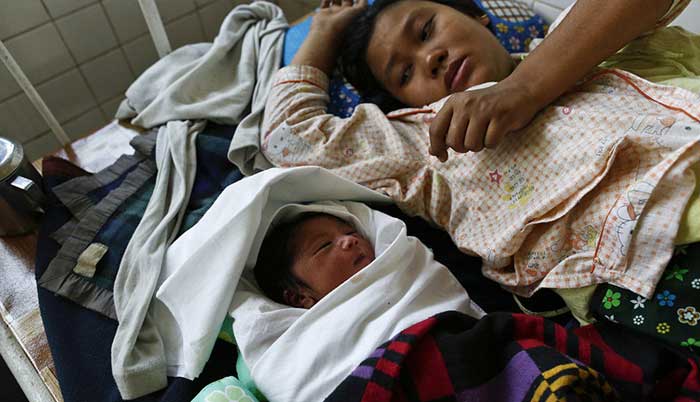![]() Home > Myanmar
Home > Myanmar
Govt Preps Policy To Cope With Falling Population Growth

A woman lies near her newborn baby in North Dagon Township hospital in Rangoon in January 2014. / Soe Zeya Tun / Reuters
![]() February 7th, 2018 | 11:43 AM |
February 7th, 2018 | 11:43 AM | ![]() 1521 views
1521 views
YANGON
Myanmar will develop and implement a national population policy in a bid to manage the country’s aging populace and declining growth rate, Minister of Labor, Immigration and Population U Thein Swe said on Monday.
The minister said the country needed a plan to prepare for the consequences of the demographic changes. He was replying to a question from Lower House lawmaker U San Shwe Win, Irrawaddy Region (Yegyi Township), about whether the government had plans to adopt a population policy.
U San Shwe Win said Myanmar’s population will eventually start shrinking according to the results of the last national census in 2014, the country’s first since 1983.
Until preliminary results from the 2014 census were released that August, the country’s official population had long stood at about 60 million. However, the census put the number at just 51.4 million, nearly 17 percent less.
According to successive reports the ministry has released based on the 2014 census, the country’s population growth rate has been declining steadily in recent years and is now among the lowest in Southeast Asia. They say a falling crude birth rate, measuring live births, was the main reason for the decline and predict a population of 65 million by 2050.
Yet Myanmar still maintains a relatively high fertility rate of 2.5 births per woman compared to its neighbors in the region.
U Thein Swe said the ministry would use the reports to draft the national population policy, taking into consideration the country’s population growth rate, life expectancy, birth rate, mortality rate and population distribution.
He added that the ministry would also consider the country’s optimum population size based on its natural resources, economy, geography, culture and military needs.
The first step will be to form a National Population and Development Commission.
“We have already asked the union government, and if it is allowed to be formed the commission will lead the process of drafting the population policy in collaboration with other ministries,” U Thein Swe said.
According to the UN Population Fund (UNFPA), which provided technical and financial support for the 2014 census project, many countries are moving away from general population policies because the demographic data a national census provides is so vast and broad. It says sector-specific policies are proving more useful.
The UNFPA country office said the 2014 census results highlighted many of the priorities the government should be addressing to improve people’s quality of life including inequalities in education and access to health care, high levels of childhood and maternal mortality, access to safe water and sanitation, and the need for more housing. It stressed the value of developing sector-specific plans to tackle them.
For example, according to the census reports, 2,800 women die each year from mostly preventable causes related to childbirth and pregnancy; the number of people 60 and older will almost triple in the next 30 years; and half a million young people cannot read or write primarily because of low school attendance rates.
“Young people represent a huge source of potential for Myanmar’s development. Government policy needs to focus on improving the standard of education, as well as on increasing school attendance and youth literacy,” said UNFPA country representative Janet Jackson.
At the same time, she urged the government to pay attention to the country’s growing elderly population and its needs.
She said Myanmar could also significantly bring down its maternal mortality rate if women were given the choice to give birth to fewer children with the help of better family planning.
Source:
courtesy of THE IRRAWADDY
by SAN YAMIN AUNG
If you have any stories or news that you would like to share with the global online community, please feel free to share it with us by contacting us directly at [email protected]